Peace Women
The seven women featured in the illustration are all Nobel Peace Prize laureates. To learn more about their stories scroll down or click on the name:
Narges Mohammadi
Malala Yousafzai
Leymah Gbowee
Tawakkol Karman
Nadia Murad
Maria Ressa
Ellen Johnson Sirleaf
I created these illustrations as part of a personal project to share images of positive role models for women and girls alike. These courageous women have raised their voices for a self-determined peaceful life for all.
Available as a scarf
in my online shop!
Wear this scarf as a testament to the power of women’s voices and the beauty of ethical fashion. Ideal as a gift or a personal keepsake, this piece is sure to inspire and empower.
Features:
Size: 68 x 68 cm
Unique Design
Organic and Sustainable: Made from 100% organic cotton and certified by Global Textile Standards (GOTS), thus ensuring a gentle touch on your skin and the environment.
Ethically Produced: Sewed with care by faktura gGmbH –an ecologically creative, social enterprise in the heart of Berlin which employs people with disabilities, thus promoting inclusivity and creativity.
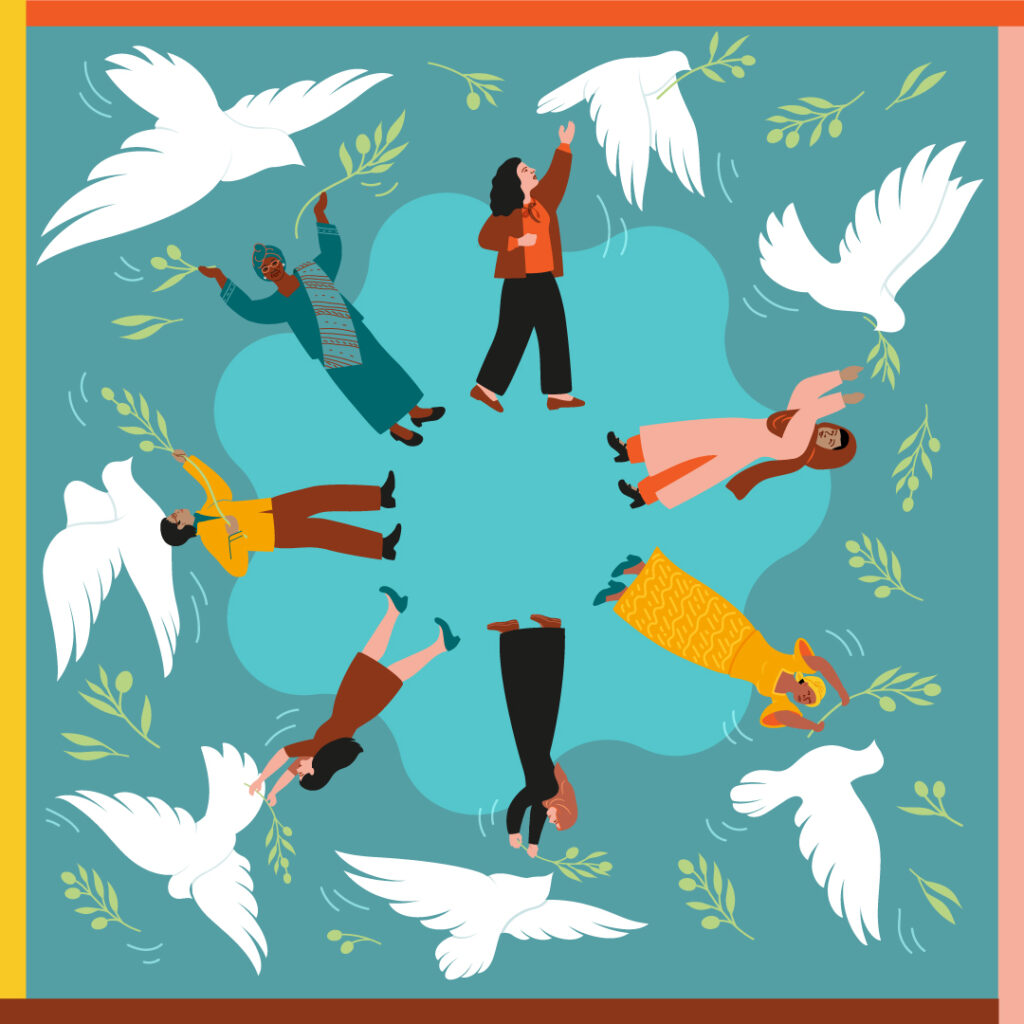
Narges Mohammadi
Iranian human rights activist
awarded the Nobel Peace Prize in 2023 “for her fight against the oppression of women in Iran and her fight to promote human rights and freedom for all”. *
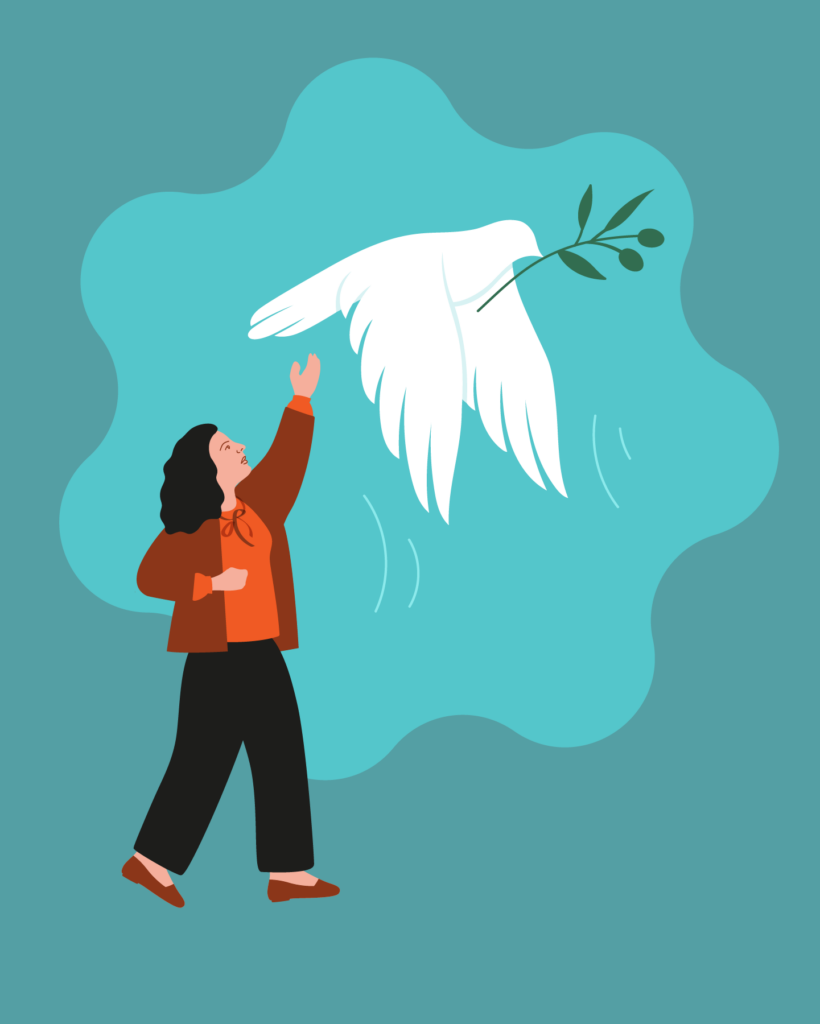
Narges Mohammadi was born on April 21, 1972 in Iran. She is a physicist by training but is best known for her work as a human rights advocate. She has worked with several organizations, including the Defenders of Human Rights Center, which was founded by Nobel laureate Shirin Ebadi.
Mohammadi’s activism has come at a high personal cost. She has been arrested multiple times by the Iranian authorities. In 2016, she was sentenced to a lengthy prison term on charges that included “assembly and collusion against national security” and “propaganda against the state.” Despite being imprisoned, she continued to speak out against the human rights abuses in Iran.
The Nobel Peace Prize awarded to Mohammadi in 2023 highlights her persistent and brave efforts to bring attention to the plight of women and political prisoners in Iran. Her recognition brings international attention to the ongoing struggle for human rights in Iran and underscores the vital role of activists in advocating for change even under severe repression.
Malala Yousafzai
Pakistani activist for girls’ education
awarded the Nobel Peace Prize in 2014 with Kailash Satyarthi, “for their struggle against the suppression of children and young people and for the right of all children to education” *
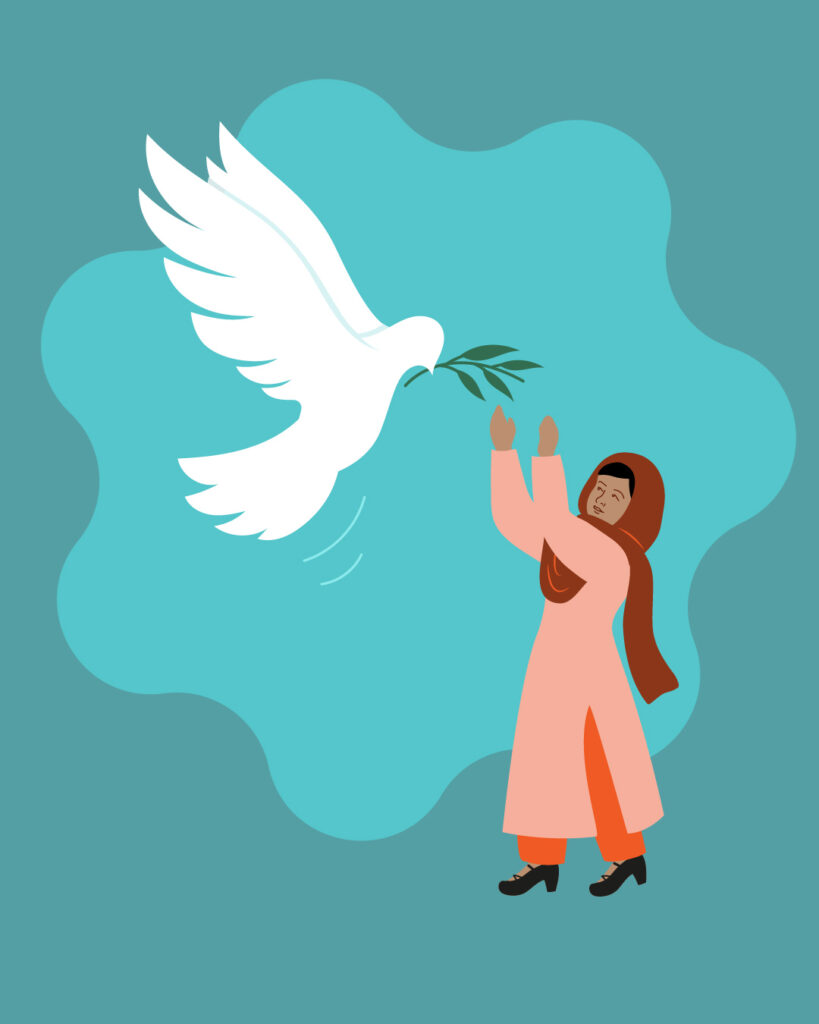
Malala Yousafzai was born on July 12, 1997 in Pakistan. Her father was an educator and ran a girls’ school in their village. She first gained international attention in 2009 when she started writing a blog for the BBC Urdu under a pseudonym, detailing her life under Taliban occupation and their attempts to ban girls from attending school. Her advocacy for girls’ education made her a target for the Taliban.
On October 9, 2012, Malala was shot in the head by a Taliban gunman while riding a bus home from school. The attack was intended to silence her advocacy, but it had the opposite effect. Malala survived after being flown to the United Kingdom for intensive treatment and rehabilitation. The assassination attempt sparked a global outpouring of support and brought even greater attention to her cause.
In 2014, Malala was awarded the Nobel Peace Prize in recognition of her struggle against the suppression of children and young people and for the right of all children to education. Malala’s award made her the youngest-ever Nobel laureate.
She co-founded the Malala Fund, an organization dedicated to ensuring 12 years of free, safe, and quality education for every girl. Malala has also authored a memoir, “I Am Malala,” which has been widely acclaimed and translated into numerous languages.
Malala graduated from the University of Oxford in 2020 with a degree in Philosophy, Politics, and Economics (PPE). Her activism remains influential as she works on a global scale to empower girls through education.
Leymah Gbowee
Liberian peace activist
Awarded the Nobel Peace Prize in 2011, along with Ellen Johnson Sirleaf and Tawakkol Karman, “for their non-violent struggle for the safety of women and for women’s rights to full participation in peace-building work” *.
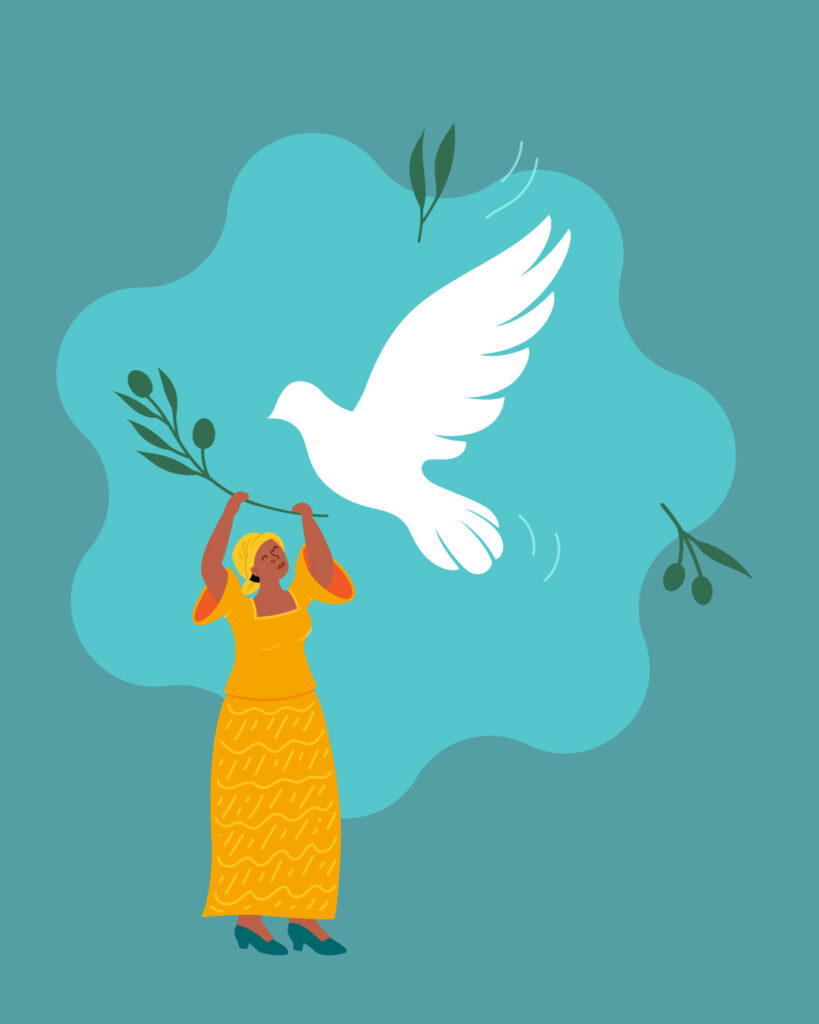
Leymah Gbowee was born on February 1, 1972, in central Liberia. She studied social work and has a background in trauma healing. Her work in peace-building and women’s rights became prominent during the late stages of the civil war in Liberia
In 2003, Gbowee organized and led the Women of Liberia Mass Action for Peace, a grassroots movement involving thousands of women from various ethnic and religious backgrounds. The movement included nonviolent protests, including a sex strike and daily sit-ins, to demand peace and end the violence in Liberia.
The efforts of Gbowee and her fellow activists were instrumental in pressuring the warring factions to agree to peace talks. Their actions contributed to the end of the Second Liberian Civil War and the eventual election of Ellen Johnson Sirleaf, Africa’s first female head of state, in 2005.
Following the civil war, Gbowee continued her advocacy work. She founded the Gbowee Peace Foundation Africa, which aims to empower women and young people through education and leadership development. She is also a prominent speaker and author, sharing her experiences and insights on the importance of nonviolent activism and the power of women’s movements.
Tawakkol Karman
Yemeni journalist, politician and human rights activist
Awarded the Nobel Peace Prize in 2011, sharing the honor with
Ellen Johnson Sirleaf and Leymah Gbowee, “for their nonviolent struggle for the safety of women and for women’s rights to full participation in peace-building work.” *
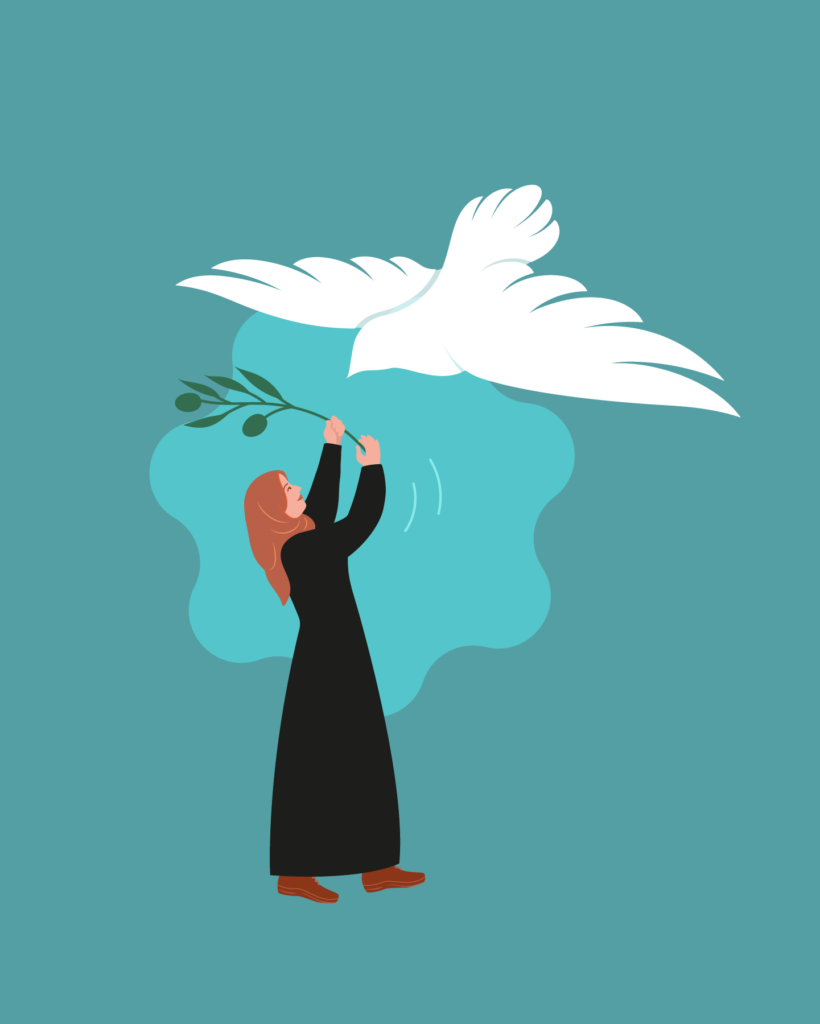
Tawakkol Karman was born on February 7, 1979, in Taiz, Yemen, into a politically active family. She has a graduate degree in political science from Sana’a University.
Karman’s activism began in the early 2000s when she became involved in journalism and started advocating for freedom of expression. In 2005, she co-founded the group Women Journalists Without Chains (WJWC), which aimed to promote freedom of the press and denounce human rights violations.
Karman’s role as an advocate for human rights and democracy became more prominent in the years leading up to the Yemeni Revolution of 2011, which was part of the broader Arab Spring movement. She emerged as a leading figure in the protests against President Ali Abdullah Saleh’s regime, which was marked by widespread corruption, economic difficulties, and lack of political freedoms. Her tireless efforts and the mass mobilization of protesters eventually led to her arrest on multiple occasions. These arrests, rather than silencing her, only galvanized further support and increased her visibility both domestically and internationally.
In October 2011, Karman was awarded the Nobel Peace Prize along with Liberian activists Ellen Johnson Sirleaf and Leymah Gbowee. She was the first Arab woman to receive the prestigious award.
After receiving the Nobel Prize, Karman continued her activism on a global scale, frequently speaking at international forums and conferences. In addition to her advocacy, Karman has been involved in various initiatives aimed at promoting peace and stability in the Middle East. She has called for an end to the conflict in Yemen and has worked with international organizations to address the humanitarian crisis in the country.
Nadia Murad
Iraqi human rights activist
awarded the Nobel Peace Prize in 2018, along with Dr. Denis Mukwege, “for their efforts to end the use of sexual violence as a weapon of war and armed conflict”. *
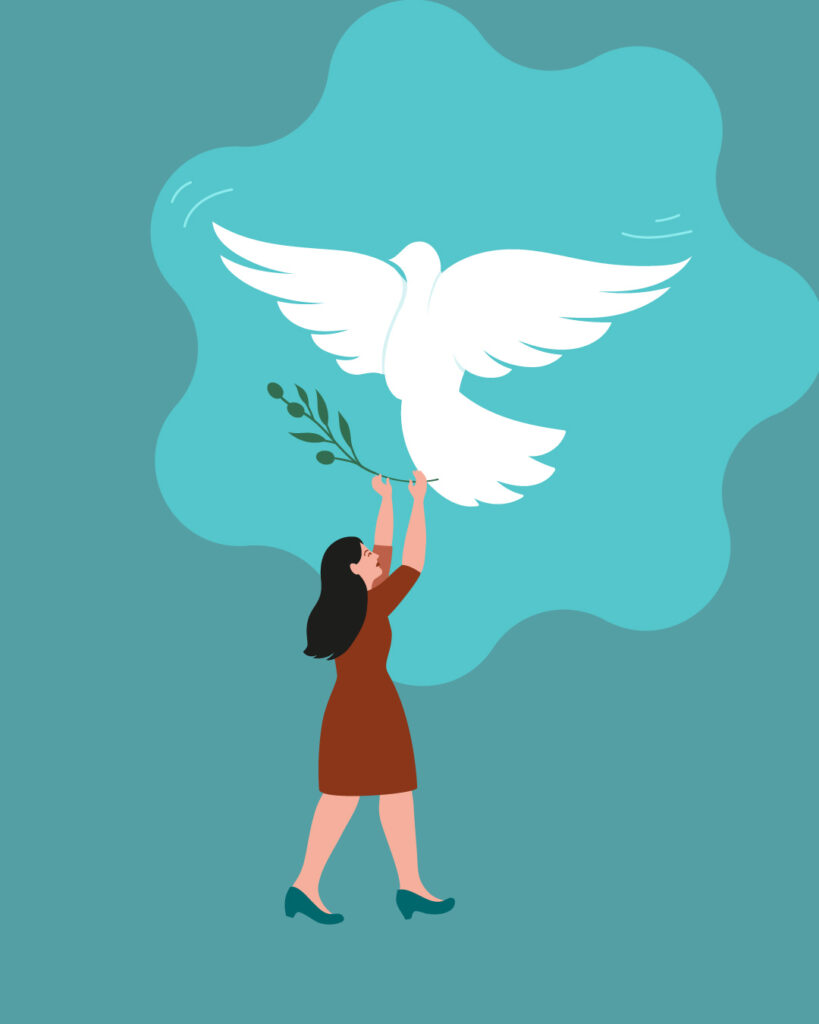
Nadia Murad Basee Taha was born on March 10, 1993, in the Sinjar District of northern Iraq. She belongs to the Yazidi community, a religious minority who has faced persecution for centuries due to their distinct religious beliefs.
In August 2014, the Islamic State of Iraq and Syria (ISIS) launched a brutal attack on Sinjar, targeting the Yazidi community. The attack resulted in the massacre of thousands of Yazidis and the abduction of many women and girls. Nadia Murad, then 21 years old, was among those captured.
Murad was held captive by ISIS for approximately three months. During this time, she endured severe physical and sexual abuse, along with many other Yazidi women and girls. Murad managed to escape captivity, finding her way to a refugee camp and eventually to Germany, where she received medical treatment and began her journey as an activist.
In 2015, she began sharing her story with the world, addressing the United Nations Security Council and various international forums. Her testimony was instrumental in bringing to light the genocide against the Yazidi community and the crimes against humanity perpetrated by ISIS.
In recognition of her extraordinary efforts to combat sexual violence and her advocacy for justice for the Yazidi people, Nadia Murad was awarded the Nobel Peace Prize in 2018, along with Dr. Denis Mukwege, a Congolese gynecologist who has treated thousands of rape survivors. The Nobel Committee praised them for their efforts to end the use of sexual violence as a weapon of war and for their courage in bringing these issues to international attention.
Nadia Murad founded Nadia’s Initiative, an organization dedicated to helping women and children who have been victims of genocide, mass atrocities, and human trafficking. The initiative focuses on advocating for survivors, rebuilding communities in crisis, and providing support to those in need.
Murad has also authored a memoir, “The Last Girl: My Story of Captivity, and My Fight Against the Islamic State,” in which she details her harrowing experiences and her fight for justice and human rights.
Maria Ressa
Filipino-American journalist and author
ADvocate for press freedom and THe fight against disinformation
awarded the Nobel Peace Prize in 2021, alongside Russian journalist Dmitry Muratov, “for their efforts to safeguard freedom of expression, which is a precondition for democracy and lasting peace”. *
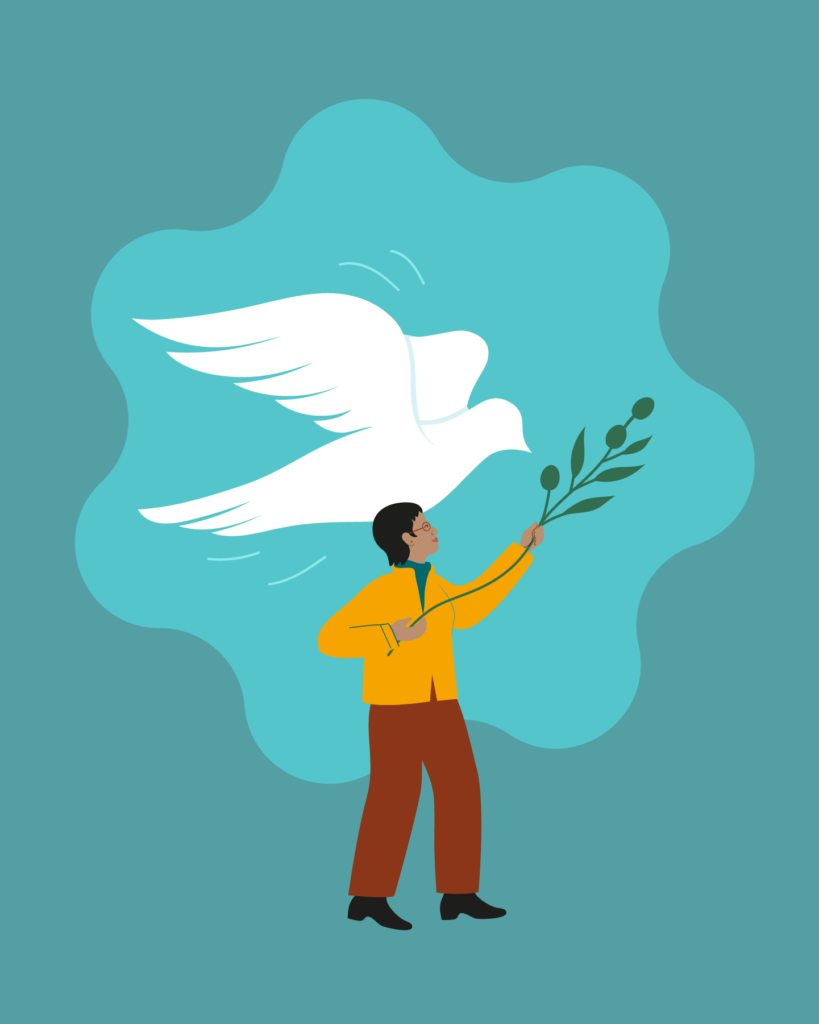
Maria Angelita Ressa was born on October 2, 1963, in Manila, Philippines. At age 10, she moved to the United States and later attended Princeton University, where she earned a bachelor’s degree in English and certificates in theater and dance in 1986. She then returned to the Philippines on a Fulbright Fellowship to study political theater at the University of the Philippines Diliman.
Ressa’s journalism career began at government television network PTV 4, and she later joined CNN, where she spent nearly two decades as an investigative reporter and bureau chief in Manila and Jakarta. She covered major events in Southeast Asia, including the rise of terrorism in the region.
In 2012, Maria Ressa co-founded Rappler, a digital news platform based in the Philippines, where she serves as the CEO and Executive Editor. Rappler quickly became known for its fearless journalism and innovative use of social media to engage audiences. The platform reported extensively on government corruption, human rights abuses, and the controversial anti-drug campaign initiated by Philippine President Rodrigo Duterte.
Ressa has been a vocal critic of the Duterte administration’s policies, particularly its war on drugs, which has resulted in thousands of extrajudicial killings. Rappler’s investigative reports on these abuses and its fact-checking initiatives to combat fake news made the platform a target for government harassment.
In 2018, the Philippine government accused Rappler of violating foreign ownership rules, an allegation widely seen as an attempt to silence the news outlet. Subsequently, Ressa faced multiple legal charges, including cyber libel and tax evasion. In June 2020, she was convicted of cyber libel in a case viewed by many as a blow to press freedom.
On October 8, 2021, Maria Ressa was awarded the Nobel Peace Prize, alongside Dmitry Muratov. The Nobel Committee recognized their courageous fight for freedom of expression in the Philippines and Russia, emphasizing that a free, independent, and fact-based journalism serves to protect against abuse of power, lies, and war propaganda.
Despite facing ongoing legal battles and threats to her personal safety, Ressa continues to advocate for press freedom and democracy. She frequently speaks at international forums, urging the global community to uphold democratic values and support independent journalism. Her memoir, “How to Stand Up to a Dictator,” recounts her experiences and underscores the importance of press freedom in holding power to account.
Ellen Johnson Sirleaf
Liberian politician and economist
first elected female head of state in Africa
awarded the Nobel Peace Prize in 2011, alongside Leymah Gbowee and Tawakkol Karman, for “their non-violent struggle for the safety of women and for women’s rights to full participation in peace-building work”. *
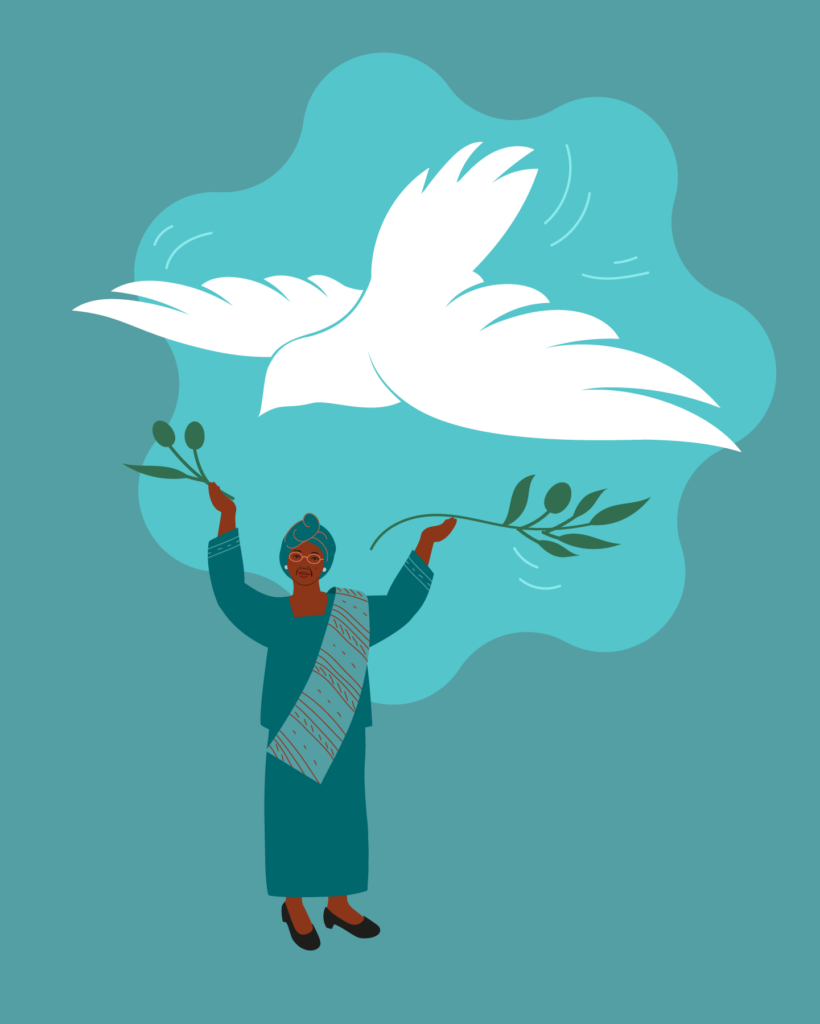
Ellen Johnson Sirleaf was born on October 29, 1938, in Monrovia, Liberia. She received her early education in Liberia and later moved to the United States, where she earned a degree in accounting from Madison Business College in Madison, a Bachelor of Arts in economics from the University of Colorado Boulder and a Master of Public Administration at Harvard University,
After completing her education, Sirleaf returned to Liberia and began a career in public administration. She held several key positions in the government, including Minister of Finance under President William Tolbert from 1979 until the military coup in 1980. Following the coup, she fled Liberia and worked for various international financial institutions, including the World Bank and Citibank, as well as serving as the Director of the United Nations Development Programme’s Regional Bureau for Africa.
Sirleaf was an outspoken critic of the regimes of Samuel Doe and Charles Taylor, which led to periods of exile. She ran for president in the 1997 elections but was defeated by Charles Taylor. After Taylor’s regime ended in 2003, Sirleaf returned to Liberia and became actively involved in the transitional government.
In 2005, Ellen Johnson Sirleaf ran for president again and won, becoming the first female elected head of state in Africa. Her presidency focused on rebuilding Liberia’s economy, infrastructure, and institutions after years of civil war. Sirleaf prioritized anti-corruption measures, economic development, and the empowerment of women. She is credited with restoring stability to a nation and laying the groundwork for future development.
Ellen Johnson Sirleaf served as the President of Liberia from 2006 to 2018. She was first inaugurated on January 16, 2006, and re-elected in 2011, serving until the end of her second term on January 22, 2018.
After leaving office, Sirleaf has continued to be active in various international organizations and an influential figure in global politics. Her memoir, “This Child Will Be Great: Memoir of a Remarkable Life by Africa’s First Woman President” details her life and career.
In 2011 the Nobel Committee awarded Sirleaf the Nobel Peace Prize in recognition of her efforts to promote women’s rights and increase female participation in politics.
*SOURCES
MLA style: Narges Mohammadi – Facts – 2023. NobelPrize.org. Nobel Prize Outreach AB 2024. Fri. 7 Jun 2024. https://www.nobelprize.org/prizes/peace/2023/mohammadi/facts/
MLA style: Malala Yousafzai – Facts. NobelPrize.org. Nobel Prize Outreach AB 2024. Fri. 7 Jun 2024. https://www.nobelprize.org/prizes/peace/2014/yousafzai/facts/
MLA style: Leymah Gbowee – Facts. NobelPrize.org. Nobel Prize Outreach AB 2024. Fri. 7 Jun 2024. https://www.nobelprize.org/prizes/peace/2011/gbowee/facts/
MLA style: Tawakkol Karman – Facts. NobelPrize.org. Nobel Prize Outreach AB 2024. Fri. 7 Jun 2024. https://www.nobelprize.org/prizes/peace/2011/karman/facts/
MLA style: Nadia Murad – Facts – 2018. NobelPrize.org. Nobel Prize Outreach AB 2024. Fri. 7 Jun 2024. https://www.nobelprize.org/prizes/peace/2018/murad/facts/
MLA style: Maria Ressa – Facts – 2021. NobelPrize.org. Nobel Prize Outreach AB 2024. Fri. 7 Jun 2024. https://www.nobelprize.org/prizes/peace/2021/ressa/facts/
MLA style: Ellen Johnson Sirleaf – Facts. NobelPrize.org. Nobel Prize Outreach AB 2024. Fri. 7 Jun 2024. https://www.nobelprize.org/prizes/peace/2011/johnson_sirleaf/facts/